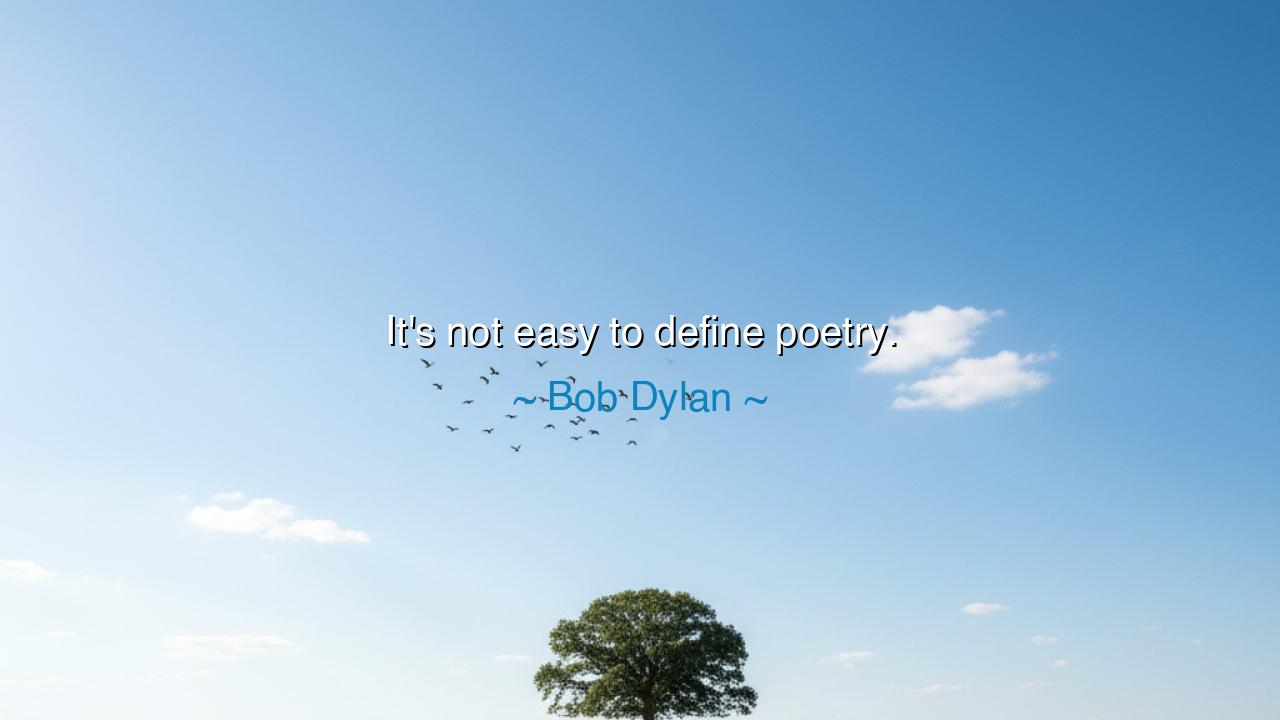
It's not easy to define poetry.






Hear, O wanderers of song and seekers of truth, the voice of Bob Dylan, who declared with simplicity and depth: “It’s not easy to define poetry.” These words, though modest in sound, carry the weight of centuries, for countless sages, artists, and prophets have struggled to bind in language what is itself the essence of language’s mystery. Poetry is as elusive as the wind, as ungraspable as light reflected upon water. The moment one tries to define it, it slips into another form, revealing that it is not an object to be captured but a force to be experienced.
For what is poetry? Some have called it heightened speech, others the music of thought, still others the soul’s cry in rhythm. Yet all such definitions fall short. Poetry is a chameleon, changing with each age, each voice, each tongue. In Homer’s Greece it was epic song, carrying the history of gods and men. In Bash?’s Japan it was a single moment crystallized in seventeen syllables. In Dylan’s own songs it became the voice of protest, longing, and wandering, blurring the line between folk music and literature. Truly, it is not easy to define poetry, because poetry is larger than every definition.
Consider the tale of Sappho, the ancient poetess of Lesbos. She wrote of love in fragments so delicate they seem like whispers from eternity. Was this poetry? Yes. Yet centuries later, Walt Whitman thundered in lines as vast as the American landscape, proclaiming “I am large, I contain multitudes.” Was this too poetry? Yes. How can one definition hold both the whisper and the thunder, the fragment and the multitude? Dylan’s words remind us that poetry refuses the prison of categories.
And yet, though it defies definition, we know it when it enters us. Poetry is recognized not by the mind alone but by the heart’s trembling. Think of Wilfred Owen, who wrote in the trenches of the Great War. His verses did not follow the classical beauty of old, but they seared with truth: the gas, the mud, the dying boys. Was that poetry? The world answered yes, for in those lines grief itself found form. Poetry is thus not defined by form alone, but by its power to awaken recognition, to make the soul cry out, This is true.
Dylan himself embodied this truth. His songs were sometimes plain, sometimes cryptic, but always imbued with a force that made listeners feel they had touched something beyond themselves. When he was awarded the Nobel Prize in Literature, many argued whether song lyrics could be called poetry. Yet the very debate proved his words: poetry cannot be easily defined. It is not limited to the page or the stage; it lives wherever language becomes flame.
The lesson, O children of tomorrow, is this: do not waste your strength in trying to cage poetry with definitions. Instead, seek to encounter it. Listen for it in the rustle of leaves, in the cry of the oppressed, in the laughter of lovers, in the hymns of worshipers, in the words of prophets, in the songs of musicians. Poetry is not a form but a force, not a cage but a current. You will know it not by its definition but by the way it moves you.
Therefore, remember Dylan’s wisdom: “It’s not easy to define poetry.” Do not be dismayed by this difficulty, but be freed by it. For the undefinable is also the infinite. Poetry will always escape the net, because it was never meant to be caught—it was meant to catch us. Seek not to define it, but to live it, to write it, to let it burn within you until your own words, however humble, carry its eternal spark.






CHChi Hoang
This quote makes me question whether defining poetry even matters. If you can feel it, isn’t that enough? Dylan seems to suggest that poetry isn’t a category or craft—it’s a way of being. I think about how his own lyrics blur the line between song and poem. Maybe that’s why he can’t define it: because poetry is always becoming something new in every voice that speaks it.
UKUy Ksor
What I love about this statement is its humility. So many people try to sound profound when talking about poetry, but Dylan just admits the truth: it’s not easy. Maybe that honesty is poetic in itself. It makes me think—does poetry resist definition because it’s meant to belong to everyone, each person defining it through their own emotions?
KUKhoi Uong
I find this quote oddly comforting. It reminds me that confusion about poetry isn’t a failure—it’s part of the experience. Even great artists like Dylan admit they can’t define it. Maybe that’s the point: poetry isn’t a thing to be understood but a way to connect with something beyond understanding. I wonder if mystery is what keeps poetry alive.
LLMy Linh Le
This line feels very ‘Dylan’—straightforward yet loaded with meaning. I think he’s acknowledging that poetry can’t be pinned down because it exists everywhere: in songs, in silence, in daily speech. It makes me wonder if definitions are even useful when it comes to art. Maybe the harder we try to define poetry, the further we drift from experiencing it authentically.
HNhanh nguyen
I like how Dylan’s simplicity here says more than most long essays about poetry. It’s true—how can anyone define something that keeps changing with every poet and every reader? Maybe poetry isn’t meant to be defined at all. It’s more like a feeling, an energy, or a way of seeing the world differently each time. Trying to box it in might actually take away its magic.